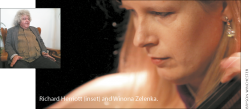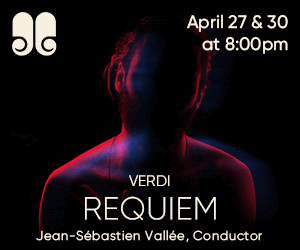 Music was what brought them together when, as eager young members of the gifted program at the Royal Conservatory in Toronto in the early 1980s, Richard Herriott and Winona Zelenka found themselves part of a hand-picked cadre of budding musicians. And music is what reunites them, after years apart and careers on opposite sides of the pond.
Music was what brought them together when, as eager young members of the gifted program at the Royal Conservatory in Toronto in the early 1980s, Richard Herriott and Winona Zelenka found themselves part of a hand-picked cadre of budding musicians. And music is what reunites them, after years apart and careers on opposite sides of the pond.
Zelenka is well known to readers of The WholeNote as a chamber and orchestral musician. Herriott is less so, although some will remember his November 6, 2011 appearance at Walter Hall in a moving tribute concert to the memory of Antonin Kubalek.
Both will be performing in the intimate surroundings of St. Stephen in-the-Fields Anglican Church on November 29 in a program featuring Benjamin Britten’s Cello Sonata (beloved by Zelenka), folk song settings by Vaughan Williams and the Canadian premiere of Herriott’s Rock Piano Concerto without Orchestra, subtitled “An Electric Organ, a Ladder and a Persian Rug.”
Britten’s seldom-performed cello sonata is a tribute to Shostakovich, while Vaughan Williams, perhaps the most quintessentially English of composers, turned to English folk songs for inspiration. Herriott’s own Rock Piano Concerto, which he composed and performed on the occasion of his 40th birthday, ten years ago, was a tribute to progressive rock, “prog rock Britannia” as he calls it. He is a big fan of Emerson, Lake and Palmer, as can be seen by their initials deftly woven into the work’s subtitle.
Hence the concert’s title: “Music of British Composers of the 2nd Elizabethan Era.”
Proceeds of this inaugural concert for Music for Autism, of which Herriott is the artistic director, will be mainly directed to the Geneva Centre for Autism, a full-service agency and resource centre for those with autism spectrum disorders and their families. Located in Toronto, the centre was named for a groundbreaking conference held in Switzerland in 1974.
Herriott refers to many studies that demonstrate the positive effect of music on children with autism, citing anecdotal evidence that many autistic individuals actually understand and appreciate complex musical compositions.
The inspiration for this venture is Music for Autism, a series of fundraising concerts established in the UK more than a decade ago by two musicians (Herriott and Duncan Honeybourne) who were themselves the parents of autistic children. Herriott, who moved to the UK and started a family there, is the father of two autistic sons, Oliver, 18, and Greg, 15, who still live in Leeds,Yorkshire. While both Oliver and his brother are highly functioning and intelligent, their social skills are limited.
Herriott remembers how, as a boy, Oliver would routinely recite prime numbers, and have no trouble multiplying various large integers that might stump lesser mortals. Herriott also recalls how, at a young age, his sons and their classmates would conduct conversations about complex mathematics that might leave their parents in the dust.
Herriott characterizes Oliver as “incredibly musical but with no idea of danger,” whereas “Greg could hum you almost an entire Brahms sonata while rummaging through your purse, and would not be able to tell you where he lives.”
“So while the ethos and vision (of Music for Autism) is to raise both awareness and revenue for autism and autism research, just as important is the opportunity to provide a venue for people with autism to hear quality live classical music,” he explains.
His hope for the concert, and the series, is to create an environment, “a haven” he says, in which the audience comes generously prepared for a significantly less decorous and more exuberant ambience than that of the typical concert, something that may also make it a welcoming environment for people with children in general.
In Leeds, the boys receive cutting-edge care and support funded by the government. When he returned to Canada a couple of years ago, Herriott quickly realized that there was a great disparity not only in the level of care, but also in general awareness and understanding of autism and Asperger syndrome. That’s why he’s hoping that every effort that can being made to heighten awareness may eventually close the gap between the level of care here and that in the UK.
Zelenka was in the audience for the Kubalek tribute concert mentioned earlier, but the salient detail that brought her and Herriott together for this endeavour after 30 years is probably the fact that, as it happens, Zelenka’s younger daughter Kathryn, 18, is also autistic. A bright, bubbly individual, Kathryn sings, loves drama, and writes stories but suffered from excruciating anxiety; she now handles the noise that used to plague her by using headphones all the time.
When Zelenka, who is assistant principal cellist of the Toronto Symphony Orchestra, mentioned this initiative to a few of her colleagues, also parents of autistic children, they were equally interested in participating.
This first Music for Autism concert will take place at St. Stephens in-the-Fields, 103 Bellevue Ave., November 29 at 7:30pm. General admission: $15. Looking ahead, Herriott will be back at Walter Hall for another tribute/celebration this coming January 26 when he will give the premiere performance of Walter Buczynski’s Piano Sonata No.8, at a concert celebrating the composer’s 80th birthday.
Rebecca Chua is a Toronto-based journalist who writes on culture and the arts.



